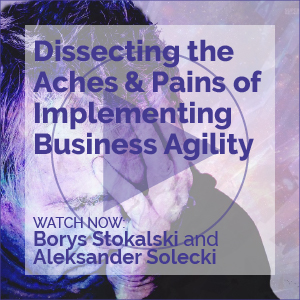Technology Disclosure Statements
Network Principles into Action
Business Process Execution Languages for Web Services (BPEL4WS)
Most companies are exploring enterprise Web service possibilities. In essence, they are considering building large-scale business processes that cross organizational boundaries. A good example would be a supply chain process that treated supplier, manufacturer, carrier, distributor, and retailer processes as subprocesses within the larger supply chain system.
Experience from the Ground Up
[Editor's Note: This Cutter IT E-Mail Advisor is a follow up to the Advisor published 19 June 2002, " Business Continuity Planning."]
Experience from the Ground Up
[Editor's Note: This Cutter IT E-Mail Advisor is a follow up to the Advisor published 19 June 2002, " Business Continuity Planning."]
Experience from the Ground Up
[Editor's Note: This Cutter IT E-Mail Advisor is a follow up to the Advisor published 19 June 2002, " Business Continuity Planning."]
Experience from the Ground Up
[Editor's Note: This Cutter IT E-Mail Advisor is a follow up to the Advisor published 19 June 2002, " Business Continuity Planning."]
Business Models and IT Architectures
Business Models and IT Architectures
Business Process Integration
The State of Software Estimation: Has the Dragon Been Slain?: (Part 1)
Software estimation has been a tough beast to control ever since the early days of programming. Some may say that we have succumbed to the dragon. During the 1980s and 1990s, there were many infamous stories about software projects running out of control and ultimately being abandoned, due to significant cost and time overruns [1]. Today, we find that software projects are still being abandoned and for many of the same reasons. This is one of the findings of a recent Cutter Consortium survey on the current state of software project estimation.
The State of Software Estimation: Has the Dragon Been Slain?: (Part 2)
I was reminded of the tale of Saint George and the Dragon (see text box below) about three years ago in a conversation with the president of a Chicago-based company that seemed incapable of delivering any piece of software on time. He was looking for someone to come in and slay the dragon -- a sweep of the sword, a thrust of the spear, and the software overruns would disappear. But, unfortunately, there is no magical solution, which is one of the reasons why so many companies today are facing the same problem of overruns.
A Perennial Problem: Software Estimation
We have a huge history of software projects we've already done. We have data from these projects.
Strategy and Portfolio Management of IT Assets: IT Imperatives for Success Today
Organizations are sailing on choppy waters these days. Seemingly endless challenges in the world economy, paired with safety and security concerns, are tossing organizations recklessly into hazardous shoals. Demands for timeliness, cost-effectiveness, and quality continue to be the standard du jour.
Strategy and Portfolio Management of IT Assets: IT Imperatives for Success Today
Organizations are sailing on choppy waters these days. Seemingly endless challenges in the world economy, paired with safety and security concerns, are tossing organizations recklessly into hazardous shoals. Demands for timeliness, cost-effectiveness, and quality continue to be the standard du jour.
Strategy and Portfolio Management of IT Assets: IT Imperatives for Success Today
If you don't know where you are going, any road will do.
-- Anonymous
Strategy and Portfolio Management of IT Assets: IT Imperatives for Success Today
If you don't know where you are going, any road will do.
-- Anonymous
IT Discipline: You Either Have It or You Don't
You can tell a lot about a company by the discipline it practices. Some companies perform due diligence, while others make decisions based on what the brother-in-law thinks. There are also consultants who will tell you how to think -- for a price, of course.
IT Discipline: You Either Have It or You Don't
You can tell a lot about a company by the discipline it practices. Some companies perform due diligence, while others make decisions based on what the brother-in-law thinks. There are also consultants who will tell you how to think -- for a price, of course.
IT Discipline: You Either Have It or You Don't
You can tell a lot about a company by the discipline it practices. Some companies perform due diligence, while others make decisions based on what the brother-in-law thinks. There are also consultants who will tell you how to think -- for a price, of course.
Risk and the Economics of Testing: Part 1
Risk and the Economics of Testing: Part 2
Getting Ready for a Service-Oriented Enterprise Architecture
This Executive Report provides practical advice on how to prepare your organization to take advantage of future changes in software. The software industry has been and will continue to be buffeted by fads and hyped information in addition to truly transformative technology.





